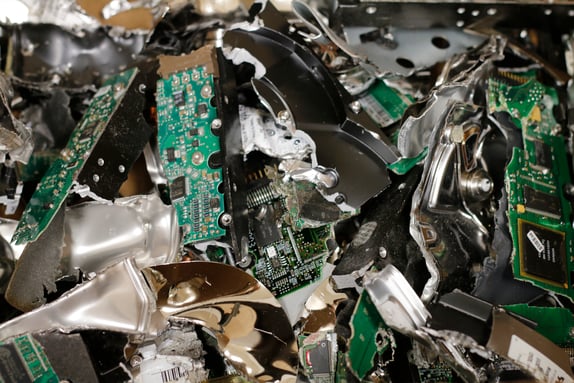3 Hard Drive Destruction Misconceptions And How to Solve Them
Mon, Mar 18, 2024
By: Jim Beran

Juggling ever-changing records management practices can be a challenge, especially when it comes to the digital processes that we have become comfortable with.
While many records managers monitor industry trends, it's important to fully understand each aspect of records management on a detailed level, including the proper methods for destroying hard drives.
Though paper records play an important role in many offices, the majority of businesses today create, process and store sensitive information on computers. With vital information stored on hard drives, it's extremely important they are disposed of properly to avoid subjecting businesses and their customers to identity theft or legal complications.
Being part of the Records and Information Management (RIM) industry, we know records managers are held to a certain standard and expected to follow specific laws and regulations to remain compliant. This is why we are sharing ways to solve 3 misconceptions about hard drive destruction.
Misconception #1: Wiping a computer hard drive on your own is simple
Just because you may have deleted files off of your computer does not mean that they have been removed from the hard drive. To confirm that files have been completely removed from a hard drive requires a method called "wiping". This is different than formatting (which does not necessarily completely remove data) and usually requires a type of software to successfully remove information. Depending on the amount of data stored, this could last a few minutes or several hours. Ultimately, reaching out for professional for technical assistance for this kind of service is advised.
Misconception #2: Disposing of a company computer in a dumpster isn't a problem
This is one of the biggest mistakes a business can make. We all have heard stories where people go dumpster-diving for paper documents in order to steal sensitive information. So, what if they find your computer in a dumpster? Not only are computers valuable, but if not disposed of properly, they may end up in the hands of a hacker. Strictly disposing of a computer into an industrial dumpster could cause many problems down the road.
Misconception #3: Can't I just use a hammer?
The way you may destroy a personal hard drive is much different than how you should destroy a business computer hard drive. Of course, it may be very simple to pull a hard drive out from its casing, take it outside, and wreck it with a hammer. The issue with this process is that there is no documentation indicating when, how, and if it was destroyed properly. Again, following destruction guidelines is essential to the rules and regulations records managers must abide by.
When it's time to turn to hard drive shredding
Hard drive shredding is the most secure, cost effective, and overall best practice a records manager will find. Many Records and Information Management (RIM) companies offer this service to offer the highest level of compliance. As we have adapted to using computers on a regular basis, there has become a demand to ensure that data is disposed of properly. When deciding which company to choose for your hard drive shredding, make sure they arecertified by the National Association of Information Destruction. Not just any company is capable of providing this type of service.
As our work environments continue to evolve with the world around us, it’s important to know how to remain safe from threats. Do you have old computers stored out in an office space and unsure of how to dispose of them? Maybe you are relocating your business and needing to let go of outdated technology. Contact us to discuss your hard drive destruction needs. To see how it's done watch our latest video below.